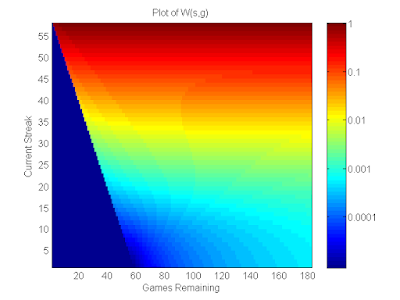Game Theory, Group Projects, and Google PageRank
One of the most common complaints about group projects in college is about work distribution: some people put in more work than others, and the people who put in more work do not think that is fair. I've worked with many different groups in college, and I've been on both sides depending on the class and the project. However, I don't actually mind putting in more work than other people when I enjoy the class and I think the project will provide a valuable learning experience. By taking the lead, I end up understanding the project material much better than I would have otherwise. However, when I don't care about the class as much, I tend to do less work. So while I can't necessarily relate to other people who put in more work and complain about their teammates, I will offer some explanation as to why some people sit on the sidelines while other people take on the burden of doing the majority of the project.
The first observation to make is that not everybody has the same goals for the class. Some people want to learn as much as possible, while other people might have a target grade in mind. And people within the same group often have different goals. Let's assume for simplicity that a group consists of 2 people: the first really wants to get an A while the second would be happy with a B. If the second person knows the first really wants to get an A, then they don't need to put in much work since the first person will do the work for them if they really want the A. On the other hand, if the first person would also be happy with a B, they would likely end up sharing the work distribution more fairly. I think this naturally explains some of the complaints about group projects. This could be formally turned into a game theory problem where the utility of a team member is a function of the grade they expect to get and the amount of work they contribute.
At the end of some group projects, you can evaluate your team members. I came up with an idea for handling the evaluations fairly. The idea is based on Google PageRank, which assigns importance values to web pages based on the importance values of the web pages that link to it. In the context of group projects, a team members importance can be approximated by the importance of the other team members and their corresponding evaluations of that team member. This way, people that put in more work, and who more thoroughly understand how much work everybody did will carry more weight in the group evaluation project, while people who did less work will carry less weight.
While I haven't worked out the details of how this modified PageRank algorithm would work, I think it is a better solution than just taking the average evaluation for each team member. While this post is unlikely to reach an audience who will be able to use this idea, it's something that has been on my mind for a while now, and publishing this blog post will help me get it off my mind.
The first observation to make is that not everybody has the same goals for the class. Some people want to learn as much as possible, while other people might have a target grade in mind. And people within the same group often have different goals. Let's assume for simplicity that a group consists of 2 people: the first really wants to get an A while the second would be happy with a B. If the second person knows the first really wants to get an A, then they don't need to put in much work since the first person will do the work for them if they really want the A. On the other hand, if the first person would also be happy with a B, they would likely end up sharing the work distribution more fairly. I think this naturally explains some of the complaints about group projects. This could be formally turned into a game theory problem where the utility of a team member is a function of the grade they expect to get and the amount of work they contribute.
At the end of some group projects, you can evaluate your team members. I came up with an idea for handling the evaluations fairly. The idea is based on Google PageRank, which assigns importance values to web pages based on the importance values of the web pages that link to it. In the context of group projects, a team members importance can be approximated by the importance of the other team members and their corresponding evaluations of that team member. This way, people that put in more work, and who more thoroughly understand how much work everybody did will carry more weight in the group evaluation project, while people who did less work will carry less weight.
While I haven't worked out the details of how this modified PageRank algorithm would work, I think it is a better solution than just taking the average evaluation for each team member. While this post is unlikely to reach an audience who will be able to use this idea, it's something that has been on my mind for a while now, and publishing this blog post will help me get it off my mind.

Comments
Post a Comment